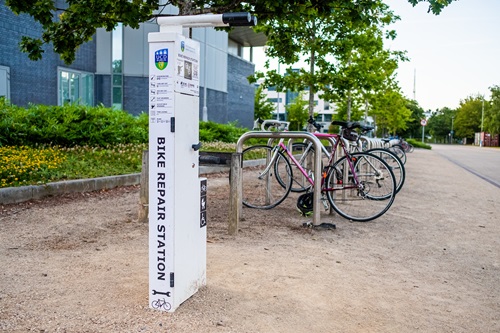
Commuting
Efficient commuting to UCD is essential for reducing carbon footprints, alleviating traffic congestion, and ensuring accessibility for students, faculty, and staff.
On This Page
Overview
UCD promotes cycling, walking and public transport use for commuting and has been awarded a gold level Smarter Travel Mark from the National Transport Authority (NTA) for its efforts to support active and sustainable travel to and from its campuses.
The Smarter Travel Mark is a three tier certification that recognises and celebrates organisations that are working to reduce single-person car usage, and gold certification is awarded to those that have put in place “outstanding measures that support sustainable and active commuting”.
UCD Estates has developed a user friendly UCD Commuting Guide with information on the various ways to get to campus. The university supports (opens in a new window)sustainable commuting, encouraging students, faculty and staff to use the range of public transport options listed in the guide.
The university also carries out an annual commuting survey which collects data on commuting habits to track progress and inform policy changes aimed at reducing the carbon footprint associated with campus travel.

Travel Plan
UCD’s travel targets are outlined in UCD’s (opens in a new window)Travel Plan 2016–2021-2026, Getting There the Sustainable Way, which is guided by three core principles - promoting sustainable travel options, encouraging activity, health and wellbeing and developing an accessible, attractive and welcoming campus.
The key highlights and realistic targets of the plan are to:
- Increase public transport usage from 41% in 2016 to 43% in 2026
- Increase walking and cycling from 34% in 2016 to 38% in 2026
- Decrease car travel from 25% in 2016 to 19% in 2026
- The above is to be achieved as UCD’s population is forecast to grow from 28,000 in 2016 to 35,000 in 2026.
UCD Commuting Review Group
This group meets on a quarterly basis to discuss transport and planning issues, focussed on the campus and its environs. The primary objective of the group is to review the implementation of UCD's Commuting Strategy. In partnership with the NTA and Dun Laoghaire Rathdown County Council.
Case Study
The UCD Energy Institute partnered with UCD library and UCD Estates Services to launch Ireland’s first ever bike pilot lending programme to members of the UCD community. The idea behind the project, brainchild of Professor Francesco Pilla, is to let people ‘road test’ electric bikes and fold-up bikes for free for six weeks, to encourage more people to invest in these more sustainable modes of transport.
